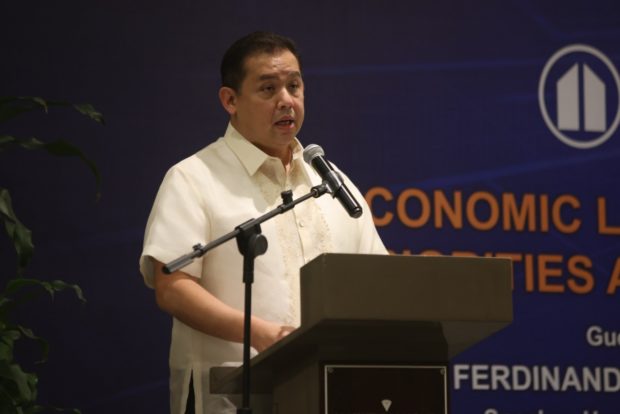
Speaker Martin Romualdez delivers his speech before the members of the Philippine Chamber of Commerce and Industry in this file photo taken on August 4, 2022. (Photo from Speaker Ferdinand Martin Romualdez’ office)
MANILA, Philippines — The House of Representatives’ committee on appropriations held an oversight hearing to know how the country’s economic managers intend to address the economic crisis and implement President Ferdinand Marcos Jr.’s game plan, Speaker Ferdinand Martin Romualdez said.
Romualdez, during the hearing of the said committee on Tuesday, said that they invited officials of departments in the Development Budget Coordination Committee (DBCC) also to identify points of cooperation between the legislative and the executive.
The DBCC is composed of the executive’s economic cluster, including the Department of Budget and Management (DBM), Department of Finance (DOF), National Economic and Development Authority (Neda), and the Bangko Sentral ng Pilipinas (BSP), and these agencies’ attached agencies.
“We have actually asked the leadership, particularly the appropriations committee, to conduct this oversight hearing to hear and to see how Congress and the economic managers can work together, pursuing our President’s whole-of-government approach to addressing problems of our economy,” Romualdez said.
“We are here together to see how we can work hand-in-hand, and we’d like to very much hear from our economic managers how we can engage and make sure that our functions here in the Congress would become more meaningful, more responsive to the needs of the Filipino people,” he added.
Romualdez, who was present during the hearing until noon, said that one issue that needs to be tackled is the pressing concern of high inflation rates.
“And of course, we approach of course the economy, and of course, one of the pressing issues is, of course, the inflation rate. Of course, this is a global phenomenon,” he said.
“But again, hearing from you would be a very, very good thing for us to prioritize, and again, I reiterate the Congress’ willingness to work hand-in-hand and as they would say, that would like to be marching in lockstep with the executive in pursuing the solutions to the economic challenges that the country faces,” he added.
Despite projections of a faster economic acceleration for 2023 — possibly a 6.5 percent gross domestic product growth on a year-on-year basis — the Philippines’ 2023 start was marred by higher inflation rates.
READ: Marcos admin expects Philippines to grow by 6.5% in 2023
Last February 7, the Philippine Statistics Authority said that the headline inflation rate for January 2023 was at 8.7 percent — higher than the 8.1 percent recorded in December 2022.
National Statistician Dennis Mapa said the January figure was the fastest since a 9.1 percent headline inflation rate in November 2008, and was almost thrice as fast as the 3 percent recorded in January 2022.
READ: Philippine inflation rose to 8.7% in January
Key economists including House Committee on ways and means chair and Albay 2nd District Rep. Joey Salceda have raised optimism on the country’s economic progress, but they have maintained that inflation remains the biggest threat to this growth.
RELATED STORIES:
Salceda: No substitute solution to rising inflation but adequate food, fuel supply
Salceda backs Marcos’ vision of PH economy with no recession, inflation dip to 4.0%